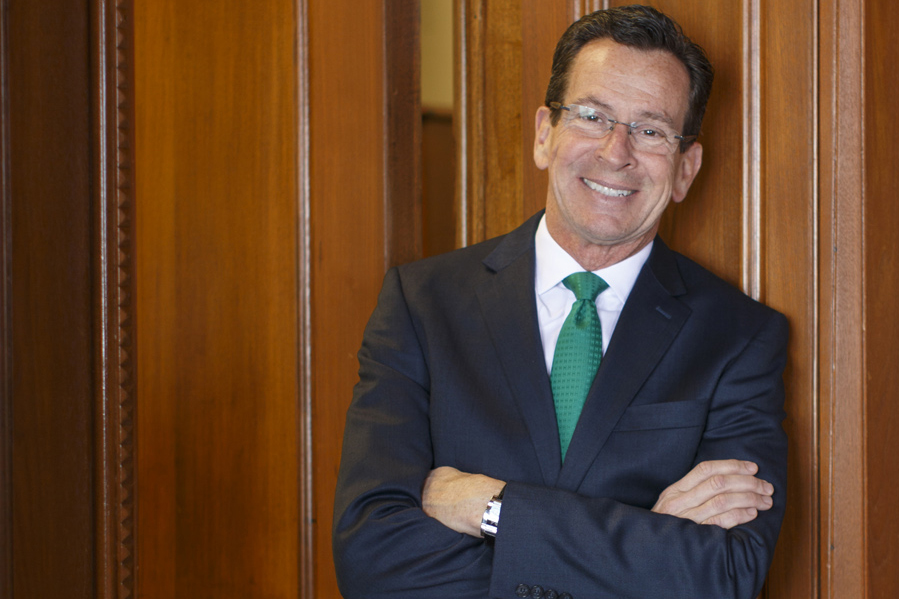Outgoing Connecticut Governor Dannel Malloy ’80, who championed gun regulation after the Sandy Hook School massacre and whose defense of Syrian refugees earned him the 2016 John F. Kennedy Profile in Courage Award, will teach at BC Law School next spring.
As the fifth Jerome Lyle Rappaport Visiting Professor in Law and Public Policy, Malloy will offer a seminar and participate in lectures and panel discussions throughout the semester. He will draw upon his combined 22 years in government as both a mayor and governor to illuminate matters across the spectrum of policy-making.
“This endowed visiting professorship has enabled us to bring the real world into our classrooms in the form of thoughtful government leaders like Governor Malloy, who offer strategic perspectives and an appreciation for the hands-on work required to produce effective policies,” said Dean Vincent Rougeau. “The Rappaport Distinguished Visiting Professorship has added insight and dynamism to our curriculum and our community, and we welcome this leader and alumnus to our faculty family.”
“As an incoming undergraduate student with a serious learning disability, BC took a chance on me at the time,” said Malloy, who received his BA and JD from Boston College. “I am forever grateful for their foresight to see the potential that I had and for supporting me in my academic success. Throughout my career, I have endeavored to also recognize potential in others and strived to help them achieve it. And now, I have the honor to give back at an institution and community that have given me so much.”
Since Malloy’s tenure as a student at BC, he has “used law every day” in his career as prosecutor, practicing attorney, occasional adjunct professor, and municipal and state chief executive. Being in a position to help students bridge the gap between the study of law and the practice of government is a way to bring them to understanding, he said.
Malloy received BC Law’s St. Thomas More Award in 2013, was the Law Schools’ Commencement speaker in 2014, and was recognized in BC Law Magazine in 2015 for his leadership. That same year, despite public resistance to resettling Syrian refugees in the US after the Paris terrorist attacks, he personally welcomed a Syrian family to New Haven after another state had denied them refuge.
“I am especially pleased to welcome Governor Malloy back to BC. I look forward to learning more about how he navigated between pragmatic political concerns and the deepest ethical principles of immigration policy and human rights,” said Professor Daniel Kanstroom, faculty director of the Rappaport Center for Law and Public Policy.
Malloy is a native of Stamford, Connecticut, where he was the city’s longest-serving mayor from 1995 to 2009. As a child, he struggled to overcome learning and physical disabilities, eventually gaining the skills he needed (and the support critical) to graduate Magna Cum Laude from BC and continue on for his law degree. After graduation, he became a prosecutor in Brooklyn, New York, serving for four years as an Assistant District Attorney and winning 22 convictions in 23 felony cases.
As governor, Malloy has made strides on many fronts: economics, education, health care, employment, infrastructure, the environment, criminal justice, and prison reform.
When he became governor in 2011, Malloy inherited a large state deficit and longstanding fiscal woes exacerbated by the nation’s slow-moving economic recovery. During his two terms, Connecticut’s private sector jobs grew at a faster rate than under the three previous administrations—adding a total of 98,100. Malloy also replenished the state’s Rainy Day Fund and balanced budgets.
In time, under Malloy’s leadership, Connecticut ushered in a series of policies aimed at addressing income inequality. The state was first in the nation to raise the minimum wage to $10.10 an hour and passed bills providing tax breaks for working families and paid sick leave for workers.
Further, Connecticut became a national leader in implementing the Affordable Care Act, stabilized state finances, increased funding to local schools, modernized infrastructure, created the Department of Energy and Environmental Protection, and passed comprehensive gun violence prevention legislation that some have called the most comprehensive in the nation. Thanks in large part to Malloy’s Second Chance Society policies, the state is experiencing the lowest crime rates since 1967 as the prison population drops to the lowest levels since 1994.
Though some of Malloy’s decisions—particularly those pertaining to tax increases and fiscal belt-tightening—were unpopular, Malloy stands by his record, saying it was his responsibility to deal with problems that his predecessors had overlooked for decades, regardless of the personal consequences.
“I don’t know how we could have been any more successful than we are right now,” Michael Lawlor, Malloy’s criminal justice policy adviser and a former state representative, said to the CT Mirror after Malloy announced in April 2017 that he would not run for a third term. “As governors go—and I’ve been here for five governors now—he’s by far the gutsiest guy I’ve ever seen in the governor’s office.”
To read excerpts from or listen to New England Public Radio’s January 4 interview with Malloy, click here.


